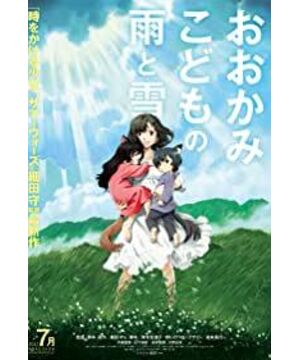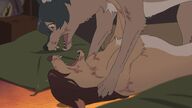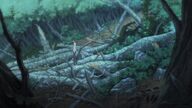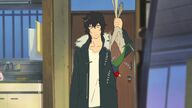However, this kind of story, which often takes place during a holiday, lasted for more than twelve years in "Wolf Children Rain and Snow". It takes a long time to review, depicting the growth and transformation of the werewolf siblings Yu and Xue in different stages vividly and reasonably, and it also gives the single mother's hard-working, one-to-one quality proof over time. The film's depiction of detailed actions is particularly good, such as the measurement of height in woodcuts, and the transition of the camera to the grade of elementary school. With a few strokes, the time dimension is filled and stretched, which is full of fun, warmth and reality.
The realism of "Wolf Children Rain and Snow" comes from the overlap of these small bridges with our childhood, which almost often makes people forget its fantasy setting. Unlike meeting chinchillas or masked men, the protagonist of "Wolf's Children Rain and Snow" is a fantasy character. The awakening of the characters depends entirely on the inside. No animals open their mouths to speak human words, and there are no elves in the forest. Moreover, fantasy themes based on nature are themselves closer to reality than science fiction themes based on technology. It is true that the sci-fi elements used by director Hosoda Mori in "The Girl Who Leapt Through Time" and "Summer Wars" are very soft and conceptual, but for example, the circular chain-shaped numbers and words that appear in the two films are still "Wolf". Children of Rain and Snow.
The overall audio-visual style of "Wolf Children Rain and Snow" is unified, with bright tones, soft colors and open composition. Whether urban or rural, the scene is derived from reality, the space is rich in layers, and the light and shade are exquisitely rendered. Motion capture follows real people, while facial features are beautified and exaggerated. Xiaoqing and cute are not lost, and they avoid hypocrisy or kitsch, appearing sincere and cute. The film is good at using fixed long shots as the full stop of several plot paragraphs, which is full of emotion and poetry.
Lick calf affectionate, gentle and moving. With a long plot time, realistic details, and excellent animation language, Mamoru Hosoda transforms the mysterious waiting and encounter into the gaze of me in the mirror, and completes the rewriting of the traditional juvenile fantasy adventure growth story.
But "Wolf Children Rain and Snow" is not just such a simple fairy tale.
"You might think it's just a fairy tale, laugh it off, and say how could such an incredible thing happen. But it's really the story of my mother, who fell in love with a werewolf."
"Mother thinks back on raising us . Twelve years, like a fairy tale with a smile, are fleeting. My mother looked at the distant mountain with a satisfied expression, and that smile made me happy. My mother is still at home in that mountain, quiet and peaceful. I live on earth."
This is the monologue of the daughter/sister Yu in the prologue and epilogue of "Wolf Children Rain and Snow". She repeatedly emphasizes the past/fairy tale relationship, seemingly eager to prove the story's credibility. The two ends of the film's text, that is, the beginning of the flower's love, and the maturity and transformation of the rain, are obviously completely true, not a fairy tale narrative performance, only the wolf in the retold mother's story is quite fantastic. As the narrator of the story, rain must have vague memories at the age in the story. At this time, how the mother who experienced the story has to be processed and interpreted cannot help but arouse our attention.
Isn't this another text from Pi's Fantastic Drift?
There is reason to speculate and conjecture in such a way that it may be over-interpreted, because the artistic processing method of hiding the truth of the incident and then presenting it to the audience in the form of fantasy is the usual trick of director Hosoda Mori. Especially in "The Girl Who Leapt Through Time" and "Summer Wars", this arrangement is particularly eye-catching.
In "The Girl Who Traveled Through Time and Space", Makoto wept bitterly for Qian Zhao's departure, because she finally understood that even if she traveled freely between time and space, she could not restore the separated friendship and lost youth. Qian Zhao's turn around and hug, and the promise of "I will wait for you in the future" are not accepted in the subsequent shots, and the wish to meet again is obviously more of Makoto's wishful thinking. In fact, "The Girl Who Leapt Through Time" repeated the collision between bicycles and trains many times. Makoto and Gongsuke both walked in front of the gate of hell in the interlaced time and space, and finally disappeared. I don't know if they transferred schools or went somewhere. The person is Qian Zhao - so I tend to think that the tragedy happened to Qian Zhao. What Makoto experienced was not only a simple farewell to youth, but perhaps the first time in her life she faced the separation from death . In a word, all the sci-fi designs that travel through time and space in the film are gorgeous disguises, and the weak core of the veneration for the youth who is no longer young is the key to touching the audience.
The ambition of "Summer Wars" is even greater. On the surface, the film is a virtual online game war, but what it actually writes is the memory of the family and the history of the nation. Regardless of the architecture, diet, characters' behaviors, the samurai families involved, representatives of all walks of life, and the relationship with the United States and other countries, there is clearly a Japanese-style nostalgia complex and cultural revival appeal. For example, in the final Xia Xi gambling battle, it must be Hua Zha poker, and it can never be Texas Hold'em. Another example is the role of a house assistant, stealing family savings to join the United States, but only providing ideas, not wanting to harm the family and the country. After getting economic returns, they are eager to return to their homeland, which is exactly the portrayal of the younger generation of Japan after the war, and the culprit of self-inflicted suffering. The culprit is the hypocritical Western Other. It is obviously too coincidental that math geniuses, master hackers, and fighting experts gather under the same roof. Of course, grandma's old friends are all over the world. Of course, it is exaggerated and tricky, but it is such typical characters and plots that make "Summer Wars" rooted Profound cultural soil, with serious social significance.
The death of the werewolf father is perhaps the most important and most unpredictable and inexplicable plot mutation in "Wolf Children Rain and Snow". With a strong physique, no matter how he looked at it, he would never miss an ordinary hunt and lose his life. The city people take the wolf's corpse calmly, and the reason for its death is avoided in the story, which also seems to have an illogical sense of hiding the true similarity. In the final analysis, what the father left behind was only a driver's license, and Yu, as a middle school student, had no current basis when he recounted the wolf in his mother's story. Wolf, what is it?
From what I see, a wolf can be anything that goes against the rules of society. He can be alien in identity or alien in behavior. In short, the intercourse and crystallization with him are enough to make the young woman face the society without face, and his departure is not even recognized by the society for a funeral. Perhaps the werewolf father was just a young and frivolous gangster, but in his mother's memory, his deviant, his enthusiasm and strength possessed the allure and appeal of a wolf.
Rain and snow are another group of interesting images. They are both natural things and symbols of purity. In the final analysis, they are different forms of the same thing. In the film, Yu and Xue's personalities and behaviors also influence and transform each other: when I was young, my elder sister Xue was lively and active, while my younger brother Yu was timid and timid; when I grew up, my elder sister became tolerant and disciplined in order to integrate into human society, while her younger brother was Rebellious and decisively bid farewell to their relatives, and eventually they became the most unexpected appearance when they were young. The most splendid passages in "Wolf Children Rain and Snow" are the laughter and laughter in a heavy snow and the sorrow and tears in a heavy rain. Mother's relief shows the rationality of all choices. All transformations in growth need to be given up. As long as you think it is worthwhile, there is no right or wrong.
It may be logically deduced according to the "Fantasy Drifting of the Young Pi", if the role of the wolf is the same as that of the tiger Richard Parker, the rain can not be another self transformed by the snow, or the character that has been eliminated, at least it is dead. relatives. The dramatic shift in the image of rain, in particular, originally came from a near-death experience of falling into a river after an adventure in the snow. If mountain villages represent the world, the more secret forests are the most suitable burial places. Even if it is not a physical death, it is undoubtedly a fact that the rain as a social person has died. Snow can regain the recognition of the society, which is the sacrifice and redemption of 12 years of disqualification in the world. And the rain, even the flower, as a disqualified person, still floats outside the world, because of the original fate, but also because of love and willingness.
The father died amid social criticism, and the younger brother was buried in the barren mountains. Would the mother tell the story to her daughter like this? But we can totally doubt and speculate, because what cannot be changed is that in the hard way of growing up, what you get is luck and what you lose is life. "Wolf Children Rain and Snow" is a poetic fairy tale or cruel reality, its tribute to mother's love, the joy and helplessness of growing up, is an excellent inheritance of traditional Japanese movies, not preaching, it is better than preaching ten million times.
Dreaming back to the past, I believe that in the heart of mother flowers, time and him have always stopped in the illusion of blooming flowers. It was also when the wind blew through the curtains, the looming face of Xue and him on the opposite side, because it was always a happy thing to be discovered, found, and recognized.
View more about Wolf Children reviews










